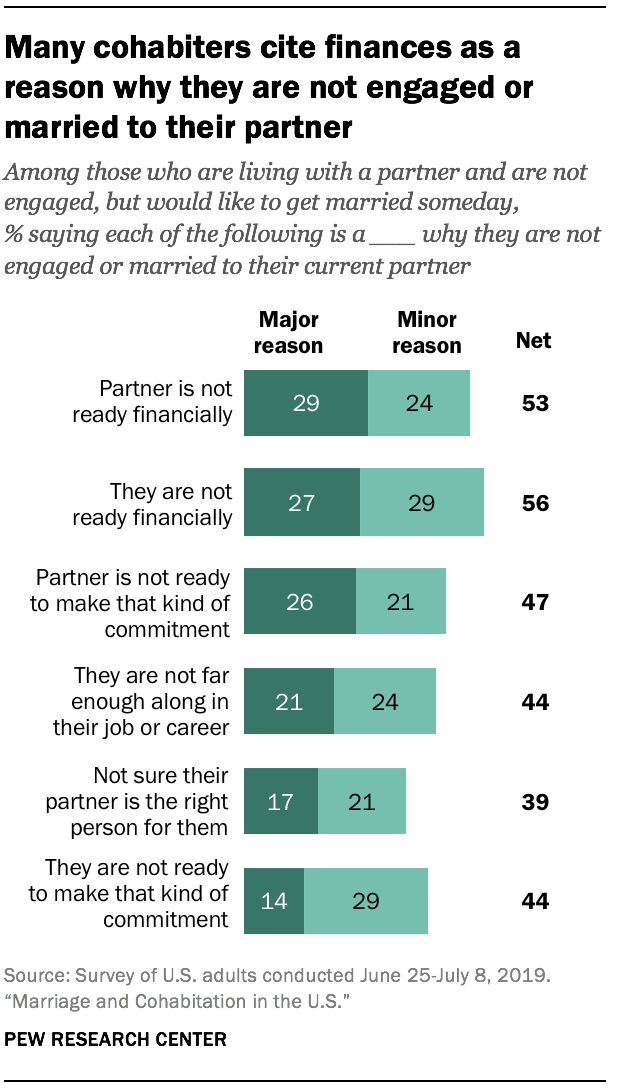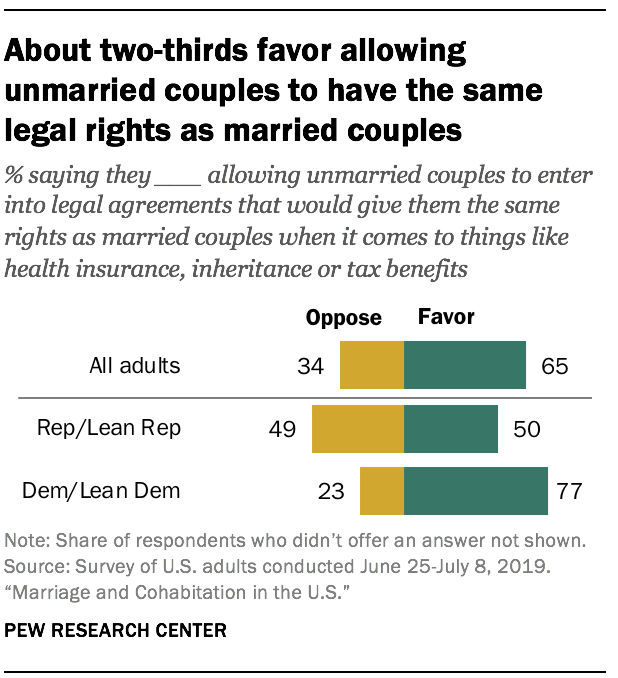Two-thirds of cohabiters who want to get married someday cite either their own or their partner’s finances as a reason why they’re not engaged or married
About three-in-ten cohabiting adults who are not engaged but say they would like to get married someday say their partner’s (29%) or their own (27%) lack of financial readiness is a major reason why they’re not engaged or married to their current partner. About a quarter (24%) say their partner not being ready financially is a minor reason, and 29% say the same about their own finances.
Roughly four-in-ten cite not being far enough along in their job or career as a major or minor reason why they’re not engaged or married to their partner. Similar shares say they (44%) or their partner (47%) not being ready to make that kind of commitment is at least a minor reason why they’re not engaged or married, though more cite their partner not being ready, rather than themselves, as a major reason (26% vs. 14%).
Younger adults are more likely to see cohabitation as a path to a successful marriage
About half of U.S. adults (48%) say couples who live together before marriage have a better chance of having a successful marriage than those who don’t live together before marriage; 13% say couples who live together before marriage have a worse chance of having a successful marriage and 38% say it doesn’t make much difference.
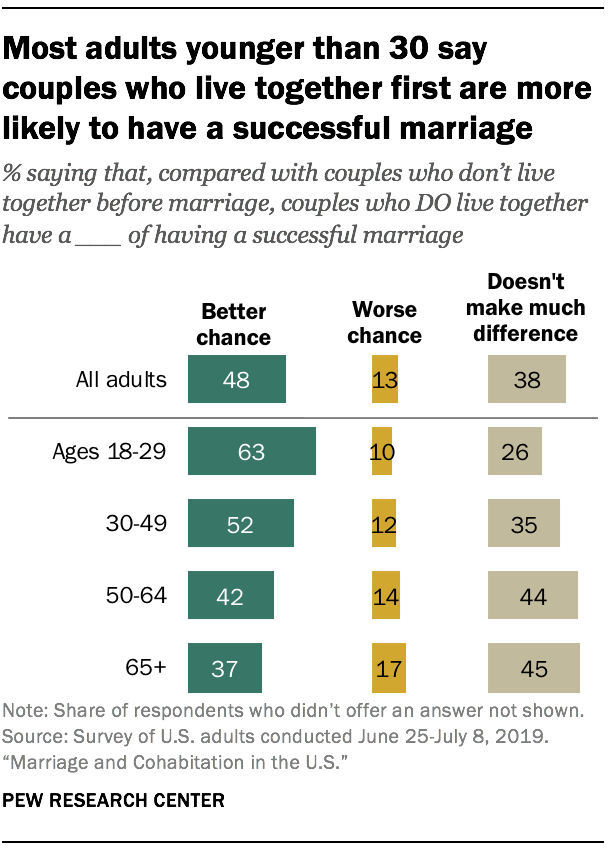 Adults younger than 30 are more likely than older adults to see cohabitation as a path to a successful marriage: 63% of young adults say couples who live together before marriage have a better chance of having a successful marriage, compared with 52% of those ages 30 to 49, 42% of those ages 50 to 64 and 37% of those 65 and older. About a third or more of those 30 and older say cohabitation doesn’t have much of an impact on a couple’s chance of having a successful marriage.
Adults younger than 30 are more likely than older adults to see cohabitation as a path to a successful marriage: 63% of young adults say couples who live together before marriage have a better chance of having a successful marriage, compared with 52% of those ages 30 to 49, 42% of those ages 50 to 64 and 37% of those 65 and older. About a third or more of those 30 and older say cohabitation doesn’t have much of an impact on a couple’s chance of having a successful marriage.
Adults who lived with their spouse before they were married are much more likely than those who didn’t to say that couples who live together have a better chance of having a successful marriage (57% vs. 24%, respectively). About a third of married adults who didn’t live with their spouse before marriage (32%) say cohabitation worsens a couple’s chance of having a successful marriage, while 44% say it doesn’t make much difference.
A majority of Americans say cohabiting couples can raise children just as well as married couples
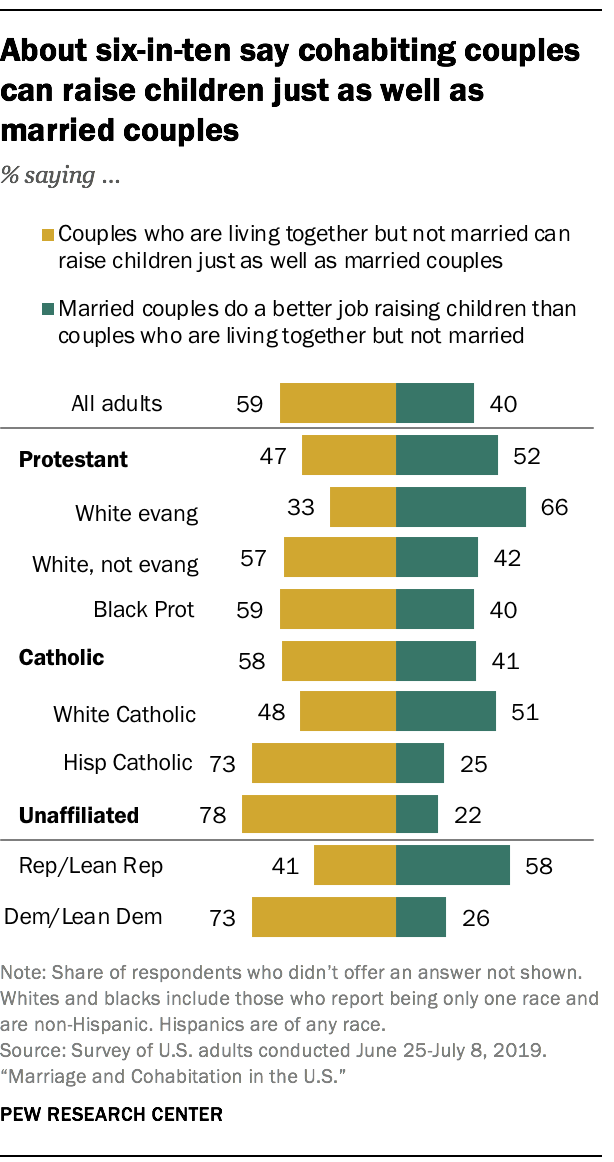 Just over half of cohabiting adults ages 18 to 44 are raising children, including about a third who are living with a child they share with their current partner. A majority of Americans (59%) say that unmarried couples who are living together can raise children just as well as married couples; 40% say couples who are married do a better job raising children.
Just over half of cohabiting adults ages 18 to 44 are raising children, including about a third who are living with a child they share with their current partner. A majority of Americans (59%) say that unmarried couples who are living together can raise children just as well as married couples; 40% say couples who are married do a better job raising children.
White non-evangelical Protestants (57%) and black Protestants (59%) are far more likely than white evangelicals (33%) to say cohabiting couples can raise children as well as those who are married.
There are also differences among Catholics: 73% of Hispanic Catholics – compared with 48% of white Catholics – say cohabiting and married couples can raise children equally well.
Views on this are also linked to partisanship. Overall, 73% of Democrats and those who lean Democratic say cohabiting couples can raise children just as well as married couples; 41% of Republicans and those who lean to the GOP say the same. These gaps persist even when taking religion and age, which are strongly linked to partisanship, into account.
Cohabiting adults (82%) are far more likely than those who are married (52%) to say couples who are living together but are not married can raise children as well as married couples. Cohabiters with and without children younger than 18 in the household are about equally likely to hold this view.
Most Americans favor allowing unmarried couples to have the same legal rights as married couples
About two-thirds of U.S. adults (65%) say they favor allowing unmarried couples to enter into legal agreements that would give them the same rights as married couples when it comes to things like health insurance, inheritance or tax benefits; 34% oppose this. For the most part, views about these types of legal agreements don’t vary considerably along demographic lines, although white (66%) and Hispanic (68%) adults are more likely than black adults (58%) to express support.
About three-quarters of Democrats (77%) favor allowing unmarried couples to enter into these types of legal agreements. In contrast, Republicans are about evenly divided, with 50% saying they favor and 49% saying they oppose this.
Most don’t see being married as essential to living a fulfilling life
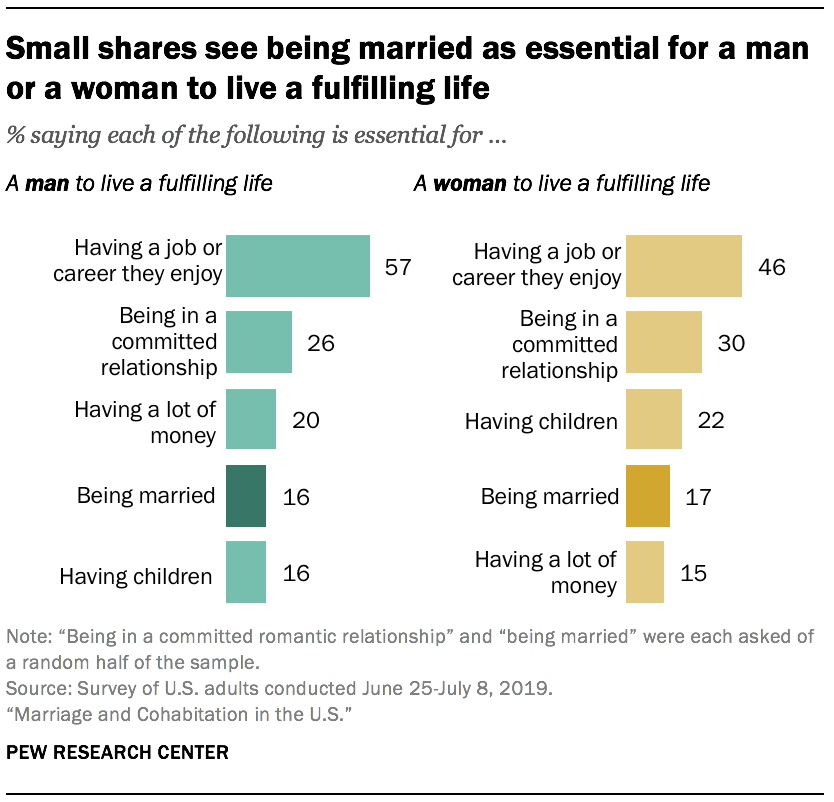 Relatively small shares of U.S. adults say being married is essential for a man (16%) or a woman (17%) to live a fulfilling life; 54% say being married is important but not essential for each, while about three-in-ten say being married is not important for a man (29%) or a woman (28%) to live a fulfilling life. When asked more generally about the importance of being in a committed romantic relationship, 26% say this is essential for a man and 30% say it is essential for a woman to live a fulfilling life.
Relatively small shares of U.S. adults say being married is essential for a man (16%) or a woman (17%) to live a fulfilling life; 54% say being married is important but not essential for each, while about three-in-ten say being married is not important for a man (29%) or a woman (28%) to live a fulfilling life. When asked more generally about the importance of being in a committed romantic relationship, 26% say this is essential for a man and 30% say it is essential for a woman to live a fulfilling life.
Far larger shares see having a job or career they enjoy as essential in order for a man (57%) or a woman (46%) to live a fulfilling life. One-in-five say having a lot of money is essential for a man, while 15% say it is essential for a woman. When it comes to having children, 22% see it as essential in order for a woman to live a fulfilling life; 16% say this is essential for a man.
Terminology
- The NSFG is administered to respondents ages 15 to 44. The analysis of NSFG data in this report includes only those ages 18 to 44. ↩
- For more details, see the Methodology section of the report. ↩
- Only 2% of married respondents and 7% of cohabiting respondents report that their spouse or partner is the same sex as them. Due to the small size of these groups, our ability to draw comparisons between those in same-sex and opposite-sex relationships is limited. Figures in this report include those in both types of relationships, unless otherwise noted. ↩
More Articles
- Berkeley Talks: Jessica Morse On How We Can Live With Fire
- Selective Exposure and Partisan Echo Chambers in Television News Consumption: Innovative Use of Data Yields Unprecedented Insights
- Veterans Health Care: Efforts to Hire Licensed Professional Mental Health Counselors and Marriage and Family Therapists
- Indoor and Vertical Farming May Be Part of the Solution to Rising Demands for Food and Limited Natural Resources
- Department of Justice Issues Annual Report to Congress on its Work to Combat Elder Fraud and Abuse
- Senate Commerce Subcommittee Set ... Protecting Kids Online: Testimony From a Facebook Whistleblower
- Adrienne G. Cannon Writes: Those Lonely Days
- What Do You Know About the Problem Solvers Caucus in the House of Representatives? They Unveiled New Bipartisan Solutions to Rebuild America’s Infrastructure, Among Other Concerns
- National Institutes of Health: Study Finds Link Between Red Hair and Pain Threshold
- Jo Freeman: The Georgia Peach Is Purple







